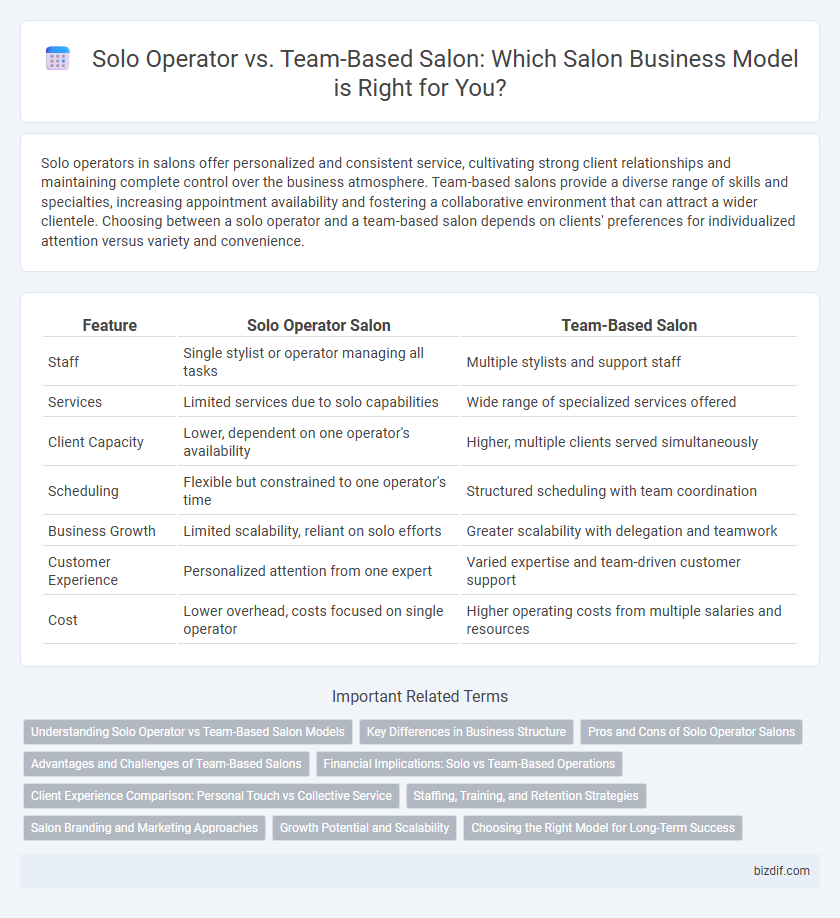Solo operators in salons offer personalized and consistent service, cultivating strong client relationships and maintaining complete control over the business atmosphere. Team-based salons provide a diverse range of skills and specialties, increasing appointment availability and fostering a collaborative environment that can attract a wider clientele. Choosing between a solo operator and a team-based salon depends on clients' preferences for individualized attention versus variety and convenience.
Table of Comparison
| Feature | Solo Operator Salon | Team-Based Salon |
|---|---|---|
| Staff | Single stylist or operator managing all tasks | Multiple stylists and support staff |
| Services | Limited services due to solo capabilities | Wide range of specialized services offered |
| Client Capacity | Lower, dependent on one operator's availability | Higher, multiple clients served simultaneously |
| Scheduling | Flexible but constrained to one operator's time | Structured scheduling with team coordination |
| Business Growth | Limited scalability, reliant on solo efforts | Greater scalability with delegation and teamwork |
| Customer Experience | Personalized attention from one expert | Varied expertise and team-driven customer support |
| Cost | Lower overhead, costs focused on single operator | Higher operating costs from multiple salaries and resources |
Understanding Solo Operator vs Team-Based Salon Models
Solo operator salons emphasize personalized client relationships and lower overhead costs, allowing for flexible scheduling and tailored services. Team-based salon models leverage a diverse group of stylists and specialists, increasing service variety and client capacity while boosting potential revenue. Understanding these models helps salon owners align business strategies with their goals, resources, and market demand.
Key Differences in Business Structure
Solo operator salons rely on a single stylist managing all aspects of the business, allowing for personalized client relationships and streamlined decision-making. Team-based salons employ multiple stylists and support staff, which enables a broader service offering, increased appointment capacity, and shared operational responsibilities. Financially, solo operators have lower overhead but limited scalability, while team-based salons require higher investment with potential for greater revenue growth through collaborative efforts.
Pros and Cons of Solo Operator Salons
Solo operator salons offer personalized client experiences with direct owner involvement in every service, often resulting in strong client relationships and brand consistency. However, these salons face limitations in scaling operations, managing appointment availability, and handling business administration alongside service delivery. The solo setup demands multitasking skills and can lead to burnout due to the workload concentrated on one individual.
Advantages and Challenges of Team-Based Salons
Team-based salons benefit from diverse expertise and increased service capacity, enhancing customer satisfaction and revenue potential. Coordinating schedules and maintaining consistent quality across multiple stylists pose significant challenges to operational efficiency. Collaborative work environments foster skill development and innovation but require effective communication and management to avoid conflicts and service inconsistencies.
Financial Implications: Solo vs Team-Based Operations
Solo-operated salons typically face lower overhead costs, with expenses mainly focused on rent, utilities, and personal supplies, allowing for higher profit margins per service. Team-based salons often encounter increased financial responsibilities including payroll, benefits, and shared resource management, which can reduce individual profit margins but enable higher overall revenue through diversified services and client reach. The choice impacts cash flow stability and growth potential, as solo operators maintain direct control of finances while team-based salons benefit from collective expertise and client volume.
Client Experience Comparison: Personal Touch vs Collective Service
Solo operators in salons typically deliver a highly personalized client experience, fostering strong relationships and tailored services that enhance customer loyalty. Team-based salons offer diverse expertise and faster service through collaborative efforts, often resulting in a comprehensive and efficient client journey. Clients seeking intimate, customized care prefer solo operators, while those valuing variety and speed lean toward team-based salons.
Staffing, Training, and Retention Strategies
Solo operator salons benefit from streamlined staffing and personalized training but face challenges in workload management and skill diversity. Team-based salons leverage specialized roles, comprehensive training programs, and collaborative retention strategies to enhance service quality and employee satisfaction. Investing in ongoing professional development and creating a supportive work environment are key factors in reducing turnover and boosting team performance.
Salon Branding and Marketing Approaches
Solo operators in salons often rely on personalized branding and word-of-mouth marketing to build strong client relationships and enhance customer loyalty. Team-based salons leverage diverse skill sets and collaborative marketing strategies, such as social media campaigns and community events, to increase brand visibility and attract a broader clientele. Both approaches require tailored branding efforts, with solo operators emphasizing individual expertise and team-based salons promoting collective professionalism and service variety.
Growth Potential and Scalability
Solo operators in salons often face limited growth potential due to restricted client capacity and time constraints, which hinders scalability. Team-based salons leverage multiple stylists and staff, enabling higher client turnover, diversified services, and increased revenue streams, fostering greater scalability. Implementing effective management systems and marketing strategies in team-based salons further accelerates operational growth and business expansion.
Choosing the Right Model for Long-Term Success
Solo operators in salons benefit from lower overhead costs and greater control over brand identity, enabling personalized client experiences and flexible schedules. Team-based salons leverage diverse skill sets and shared responsibilities to attract a broader clientele and increase service variety, supporting scalability and sustained growth. Selecting the right model depends on factors such as business goals, workload management preferences, and long-term financial plans.
Solo operator vs Team-based salon Infographic

 bizdif.com
bizdif.com